Production chain: monitoring, control and management
Our practices are aligned from end to end
We strictly follow the practices that guarantee animal welfare throughout BRF production. It also extends to integrated producers responsible for animal husbandry.
In addition to the units themselves, BRF has the vertical integration system, which are partnerships with animal husbandry producers. BRF provides animals, inputs and technical assistance, and integrated producers provide labor and structure following the guidelines of the BRF Program Animal Welfare Made in BRF. Its non-compliance or failures to comply with the rules may cause the breach of the contract.
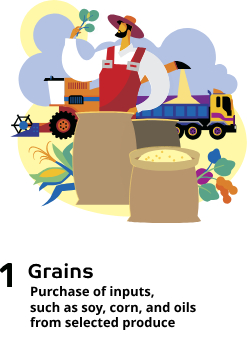
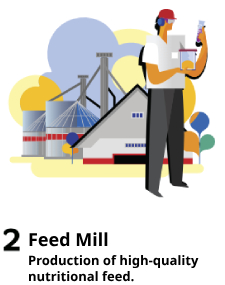
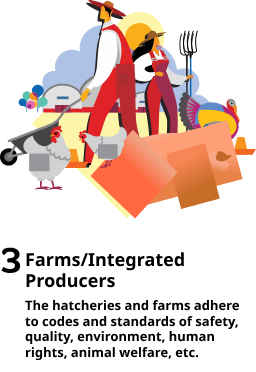
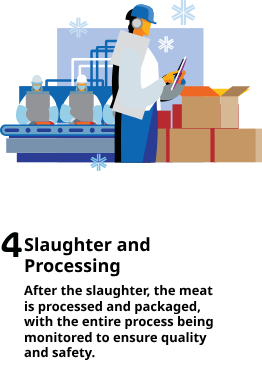




BRF's operations involve broiler chicken, Turkiyes, pork (produced under the supervision and control of BRF through its own operations and farmers partners) and also beef, dairy products, vegetables and non-fertile eggs from approved and audited suppliers, who sign the Supplier Code of Conduct document, with animal welfare being one of the items in which the supplier undertakes to comply.
Each of the species has a distinct participation in BRF's value chain. The table provides a description of the operations. It is worth mentioning that 100% of the raising and slaughter of pigs and Turkiyes is located only in Brazil.
| Subsidiary | Operations |
|---|---|
| Brazil (Main brands: Sadia, Perdigão, Veg&Tal, BIO, Qualy) | In Brazil, the company's breeding and slaughter operations involve chickens, Turkiyes and pigs. In the processing operations for industrialized products, in addition to the proteins already mentioned, beef cattle, eggs and dairy products purchased from carefully selected and monitored suppliers are used as raw material. |
| Turkiye (Brand: Banvit) | In Turkiye, BRF has three slaughter units, which slaughter only broiler chicken. Inputs from cattle, eggs, and dairy products are also purchased for the processing of private label products (BANVIT). |
| Middle East | The relationship with the Middle East dates back to the 1970s, when we started exporting to the region. Mainly with the Sadia brand, we have served heated and promising markets, especially in branded and value-added products. We have 5 production units, but none involves animal breeding and slaughter operations. Raw materials from chickens and Turkiyes are sent from Brazil to these factories. |
Since of 2021, BRF started a process of mapping suppliers of animal inputs. The AW Management prepared questionnaires addressing the most relevant aspects of Animal Welfare, requesting information on methods of raising, slaughter, certification and environmental enrichment. These questionnaires were forwarded to our beef and dairy suppliers.
Through this action, BRF wishes to move the chain in the search for best animal welfare practices for all animals participating in its chain. See the proportion of animals raised at BRF and from suppliers.
| PERCENTAGE OF ANIMALS IN THE BRF PRODUCT CHAIN | |||||
|---|---|---|---|---|---|
| Type | Percentage | Country | Additional notes | ||
| Broiler Poultry | 70.40% |
|
Chicken production in Turkiye and Brazil. 100% of production together in a vertical system. | ||
| Swine | 26.20% | Brazil: 100% | Production allocated only in Brazil, in integrated partners. | ||
| Turkiye | 2.10% | Brazil: 100% | Production allocated only in Brazil, in integrated partners. | ||
| Cattle | 0,70% |
|
There is no raising or slaughter of cattle at BRF. Protein is purchased from third-party suppliers. | ||
| Dairy Products | 0,60% | Brazil: 100% | There is no raising or slaughter of cattle at BRF. Protein is purchased from third-party suppliers. | ||
| Eggs | 0,01% |
|
There is no raising or slaughter of cattle at BRF. Protein is purchased from third-party suppliers. | ||
| Vegetables | 1.52% | Brazil: 100% | Veg&Tal Line (BRF vegetarian line, composed of vegetables such as: broccoli, potatoes, similar to meat and pies). | ||
Alternative Proteins
By 2050, the Earth will have 10 billion inhabitants, with a projected increase in protein demand of around 70%, according to UN data.
Amid the growth in population and consumption, new habits are emerging, and alternatives to traditional protein production are being developed to address both the increased demand and the changing preferences of consumers.
In a Nielsen survey, 30% of people said they were paying attention to the ingredients in food products. Responding to this scenario, BRF is investing not only in the traditional protein market but also in presenting alternative consumption options, with new products and solutions that address the challenges and needs of the next 30 years.
Within this alternative segment are so-called 'cultivated proteins' and plant-based proteins. In addition to operating in Brazil with Veg&Tal, BRF has partnered with Israeli company Aleph Farms to produce cultivated protein aimed at serving all our customers and consumers while diversifying the protein portfolio. This effort focuses on innovation for new products and also driving innovation within our current core business.
Investments in cultivated protein and plant-based solutions reinforce BRF's global multiprotein platform strategy. These initiatives not only contribute to the diversification of our protein portfolio, which is a fundamental strategic guideline for our operations, but by expanding our range with alternative proteins, we also reaffirm our commitment to reducing our business’s dependence on animal-based products, thereby promoting greater sustainability and innovation in the food sector.
Learn more: https://www.sadia.com.br/vegtal/
Suppliers
BRF seeks to promote Animal Welfare both within and outside its production. Some practices that are not encouraged by BRF are:
- The use of tethers for movement restriction (Tethering).
- Feather plucking (live plucking).
- Removal of strips of wool skin around the pelvic area of a sheep to prevent parasitic infection (Mulesing).
- Separation of Cow/Calf.
- Rearing birds in cages.
- Foie Gras (and meat from animals that were raised for the production of Foie Gras).
We are working with our suppliers to ensure that these practices do not occur in the animal farming system. We would like to make it clear that BRF does not engage in any of the aforementioned practices and does not commercialize feathers obtained from live plucking or sheep meat/products. This recommendation applies to all products that carry the BRF brand globally.
Cattle
The use of beef represents about 0.7% of BRF's products globally. With about 74% of the chain mapped, we can say that these are 100% free of restrictive confinements (darkhouse); 96% free of dehorning and 100% raised in groups and with access to pasture.
Dairy Products
Products derived from dairy products are part of BRF's portfolio, used as ingredients in our cheeses, curd and industrialized products. We purchase the ready-made products from selected suppliers and permanently audited by our team. Dairy products represent about 0.The use of beef represents about 0.7% of BRF's products globally. With approximately 74% of the supply chain mapped, we can affirm that 92% of it is dehorning-free, 100% of the animals are raised in groups, and 9.73% of the company's global supply chain is free of confinement in CAFOs or feedlots.
Eggs
We do not produce eggs for use in foods made at BRF. The production of eggs at BRF aims to produce chicks that supply our own production chain.
Foie Gras
BRF undertakes not to produce or sell Foie Gras. Forced feeding of animals is prohibited.
Poultry
At no stage of the birds' life cycle is feather grubbing accepted or allowed at BRF.
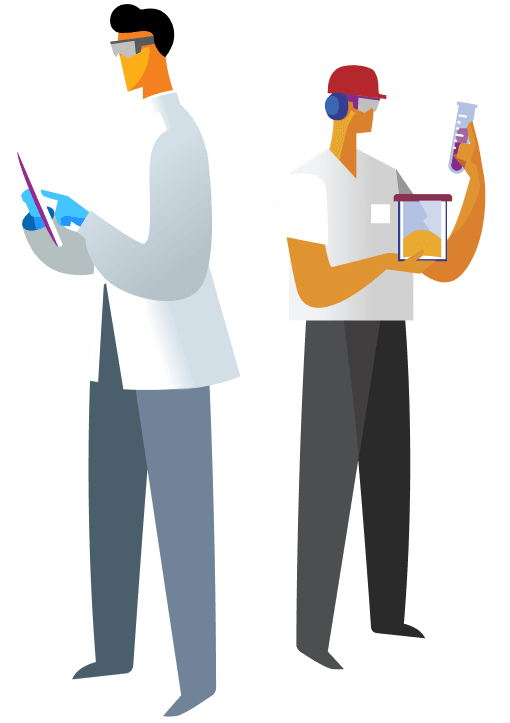
The Routine of Internal and External Evaluations and Audits
Since 2023, 100% of integrated partners will be evaluated according to animal welfare requirements.
All employees of the Company undertake to follow the Company's Transparency Manual, where one of the matters foreseen is the obligation to comply with Animal Welfare standards.
When non-compliance with the Company's animal welfare standards and internal guidelines is observed, employees must be notified so that the appropriate measures are adopted, aiming at correcting non-compliance with the standard/guideline, which may even culminate in dismissal.
Our third parties, including: integrates, catching and loading teams must comply with the suppliers' code of conduct, with Animal Welfare being one of the matters contemplated within this code. These are also evaluated. In case of non-compliance with public commitments and Animal Welfare procedures, sanctions are applied ranging from warnings, failure in audits and suspension until deviations are investigated. These suppliers are blocked until the correction of non-conformities and can only return to the process after correction. Depending on the severity of the non-compliance, the supplier will no longer provide service to the company.
All BRF raw material suppliers undergo careful evaluations in Animal Welfare and Quality.
Certifications from External Organizations
Currently, 100% of pigs are slaughtered in units that have third-party certification through the North American Meat Institute protocol, exclusively focusing on animal welfare. For broiler chickens, 85.2% are slaughtered under third-party certification, according to the National Chicken Council protocol, and 100% of turkeys are slaughtered under third-party certification, following the National Turkey Federation protocol. The audits are conducted by professionals approved by the Professional Animal Auditor Certification Organization (PAACO).
The Certified Humane, Antibiotic-Free Product, and Global G.A.P. protocols also audit the broiler farming chain.
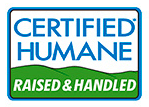
Certified Humane
International Certification that considers the quality of life of animals since birth.
The requirements are superior to various world standards and ensure, within several factors, that animals are free to express their natural behavior. This certification gave rise to the Sadia Bio Line, with a high level of animal welfare in the poultry farming.
This certification gave rise to the Sadia Bio Line, with a high level of animal welfare in poultry breeding.
Learn more about Sadia BIO range
Learn More
Antibiotic-free product
The birds are inspected from birth, through the hatchery and the feed consumed by the animals, ensuring that no growth-promoting antibiotics are used, as well as antibiotics for therapeutic use during the raising of the animals by an external certifier. This certification is also part of the Sadia BIO line.
Learn More
PAACO
The PAACO (Professional Animal Auditor Certification Organization) auditors are responsible for verifying compliance with standards related to the humane slaughter of poultry, which follows the premises established by the North American National Chicken Council (NCC), a world reference in the poultry segment. These professionals also audit the pig chain, ensuring that the animals are respected until the end of their life. In the slaughter of pigs, the requirements of the N.A.M.I. (North America Meat Institute) are followed, which has as one of the collaborators the renowned Dr. Temple Grandin.
Learn More
Global G.A.P. IFA
(Integration Farm Assurance)
Private organization that sets voluntary standards for the certification of agricultural products worldwide.
It works as a manual of good agricultural practices. The basis of the protocol, in addition to good practices, is animal welfare. The certification covers from the beginning of the broiler chain to the transport of poultry, including egg-producing matrices, hatchery, fattening and transport. Currently, we have 69 integrated certificates in Marau/RS and Serafina Corrêa/RS, Chapecó/SC and Faxinal dos Guedes/SC. Learn More
Global G.A.P. CFM
(Compound Feed Manufacturing)
The CFM defines the control points and compliance criteria for quality assurance in the production, supply and purchase of raw materials and feed ingredients. It covers all stages of production from purchase, handling and storage to processing and distribution.
Currently, the feed mill in Marau/RS is certified in this demanding protocol.
Learn More